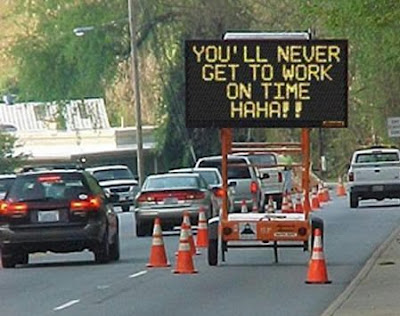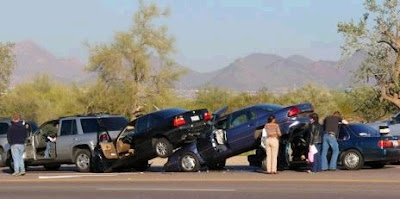Click on the "Play" button to view video...
Wednesday, July 30, 2008
Ad: Grandma-proof laptop: Lenovo ThinkPad
Click on the "Play" button to view video...
Monday, July 14, 2008
Six ways you are wasting gas...
With all the worry over fuel prices, you'd think drivers would do whatever they can not to waste gas. But look around and you'll see lots of them tooling around as if they owned their own tanker fleet. One of them might be you.
Here are six ways drivers typically waste gas every on every trip:
1. Racing away from green lights
When the light turns green, you don't have to take off as quickly as possible. That pedal under your right foot is called the "gas pedal" for a good reason. The more you press down on it, the more gas you're pumping into the engine.
Press lightly on the gas pedal, and you'll still accelerate, and you'll still get where you're going. You might be surprised at how little pressure it takes to get your car up to speed in a reasonable time.
2. Racing up to red lights
When you're driving down the street, and you see a light red light or stop sign up ahead, you should lay off the gas sooner rather than later. There's no point in keeping your foot on the gas until just before you reach the intersection. Let off the pedal sooner and give your engine a rest as you coast to the stop while braking gently. As an added benefit, your brake pads will last longer, too.
By themselves, these first two tips can improve your fuel economy around town by as much as 35 percent, according to tests conducted by automotive information Web site Edmunds.com.
3. Confusing the highway with a speedway
Even if it doesn't involve hard acceleration, speeding wastes gas. The faster you go, the more air your vehicle has to push out of the way. It's like moving your hand through water. The faster you try to move your hand, the harder the water pushes back. In tests by Consumer Reports, driving at 75 miles per hour instead of 65 miles per hour reduced fuel economy by between 3 and 5 miles per gallon, depending on the vehicle.
4. Bumper-buzzing
Tailgating is a bad move for many reasons. First of all, it's unsafe. You reduce your ability to react if the car in front of you slows or stops. It also means you have to pay ultra-close attention to that car which reduces your ability to scan for other hazards ahead of you and to
the sides. And tailgating wastes gas. Every time the driver ahead taps his brakes, you have to slow down even more than he did. (That's because you can't react immediately so you have to slow even more because you're slowing down later.) Then you accelerate again to get back up to speed and resume your bumper-buzzing routine. Hang back and you'll be safer - plus you'll be able to drive more smoothly and use less fuel. A good rule of thumb is to allow two seconds
of space between your car and the one ahead. You can figure that out bycounting off two seconds after the car in front of you passes an obvious landmark like an overpass.
5. Driving standing still
You've probably heard that it takes more gas to restart a car than to let it run. Maybe that used to be true, but it isn't anymore. Withmodern fuel-injection engines, it takes very little extra gas to restart a car once it's warmed up. Idling, meanwhile, burns about a half-mile worth of gas every minute, according to the California Energy Commission. That's why hybrid cars shut down their gasoline engines whenever they stop, even for a moment. Now you don't want to shut your engine down for every little stop in your regular, non-hybrid car - it's not designed for that - but if you're waiting for someone to run in and out of a convenience store, turn off the engine. And don't go through the drive-through at fast food restaurants. You're already paying enough for the oil in those chicken nuggets.
Bonus tip: Don't idle your engine to let it warm up before driving. It does your engine no good and it wastes gas. Instead, start driving right away, but drive gently until the engine is warm.
6. Short hops
For really short trips, take advantage of the opportunity to get some exercise. Try walking to the store instead of driving. You can save gas and burn a few calories instead. If you can't hoof it, save up your errands. A lot of short hops that let the engine cool down at home between trips can use twice as much gas as starting the car once and making a big sweep to all your stops, according to the U.S. Department of Energy. Go to your farthest destination first so your engine has a chance to reach its optimal operating temperature. Then make your other stops on the way back. With the engine warmed up, the car will restart easily and run efficiently all the way home.
Saturday, July 12, 2008
LIFE IN THE 1500'S
Here are some facts about the1500s:
Most people got married in June because they took their yearly bath in May, and still smelled pretty good by June. However, they were starting to smell, so brides carried a bouquet of flowers to hide the body odour.
Hence the custom today of carrying a bouquet when getting married.
Baths consisted of a big tub filled with hot water. The man of the house had the privilege of the nice clean water, then all the other sons and men, then the women and finally the children. Last of all the babies. By then the water was so dirty you could actually lose someone in it.
Hence the saying, Don't throw the baby out with the Bath water..
Houses had thatched roofs-thick straw-piled high, with no wood underneath. It was the only place for animals to get warm, so all the cats and other small animals (mice, bugs) lived in the roof When it rained it became slippery and sometimes the animals would slip and fall off the roof.
Hence the saying . It's raining cats and dogs.
There was nothing to stop things from falling into the house.. This posed a real problem in the bedroom where bugs and other droppings could mess up your nice clean bed. Hence, a bed with big posts and a sheet hung over the top afforded some protection.
That's how canopy beds came into existence.
The floor was dirt. Only the wealthy had something other than dirt.
Hence the saying, Dirt poor.
The wealthy had slate floors that would get slippery in the winter when wet, so they spread thresh (straw) on floor to help keep their footing. As the winter wore on, they added more thresh until, when you opened the door, it would all start slipping outside. A piece of wood was placed in the entranceway. Hence the saying a threshhold. (Getting quite an education, aren't you?)
In those old days, they cooked in the kitchen with a big kettle that always hung over the fire. Everyday they lit the fire and added things to the pot. They ate mostly vegetables and did not get much meat. They would eat the stew for dinner, leaving leftovers in the pot to get cold overnight and then start over the next day. Sometimes stew had food in it that had been there for quite a while. Hence the rhyme, Peas porridge hot, peas porridge cold, peas porridge in the pot nine days old..
Sometimes they could obtain pork, which made them feel quite special. When visitors came over, they would hang up their bacon to show off. It was a sign of wealth that a man could, bring home the bacon. They would cut off a little to share with guests and would all sit around and chew the fat.. (eeeeeks)!
Those with money had plates made of pewter. Food with high acid content caused some of the lead to leach onto the food, causing lead poisoning death. This happened most often with tomatoes, so for the next 400 years or so, tomatoes were considered poisonous.
Bread was divided according to status. Workers got the burnt bottom of the loaf, the family got the middle, and guests got the top, or the upper crust (which has come to mean the elite).
Lead cups were used to drink ale or whisky. The combination would sometimes knock the imbibers out for a couple of days. Someone walking along the road would take them for dead and prepare them for burial. They were laid out on the kitchen table for a couple of days and the family would gather around and eat and drink and wait and see if they would wake up.
Hence the custom of holding a wake.
England is old and small and the local folks started running out of places to bury people.. So they would dig up coffins and would take the bones to a bone-house, and reuse the grave. When reopening these coffins, 1 out of 25 coffins were found to have scratch marks on the inside and they realized they had been burying people alive. So they would tie a string on the wrist of the corpse, lead it through the coffin and up through the ground and tie it to a bell. Someone would have to sit out in the graveyard all night (the graveyard shift.) to listen for the bell; thus, someone could be, saved by the bell or was considered a ..dead ringer..
And that's the truth. Now, whoever said History was boring ! !
Trivia Facts
2. Until babies are six months old, they can breathe and swallow at the same time. Indeed convenient!
3. Offered a new pen to write with, 97% of all people will write their own name to test it.
4. Male mosquitoes are vegetarians. Only females bite.
5. The average person's field of vision encompasses a 200-degree wide angle.
6. To find out if a watermelon is ripe, knock it, and if it sounds hollow then it is ripe.
7. Canadians can send letters with personalized postage stamps showing their own photos on each stamp.
8. Babies' eyes do not produce tears until the baby is approximately six to eight weeks old.
9. It snowed in the Sahara Desert in February of 1979.
10. Plants watered with warm water grow larger and more quickly than plants watered with cold water.
11. Wearing headphones for just an hour will increase the bacteria in your ear by 700 times.
12. Grapes explode when you put them in the microwave.
13. Those stars and colours you see when you rub your eyes are called phosphenes.
14. Our eyes (Pupils) are always the same size from birth, but our nose and ears never stop growing.
15. Everyone's tongue print is different, like fingerprints.
16. Contrary to popular belief, a swallowed chewing gum doesn't stay in the gut. It will pass through the system and be excreted.
17. At 40 Centigrade a person loses about 14.4 calories per hour by breathing.
18. There is a hotel in Sweden built entirely out of ice; it is rebuilt every year.
19. Cats, camels and giraffes are the only animals in the world that walk right foot, right foot, left foot, left foot, rather than right foot, left foot .
20. Onions help reduce cholesterol if eaten after a fatty meal.
21. The sound you hear when you crack your knuckles is actually the sound of nitrogen gas bubbles bursting.














